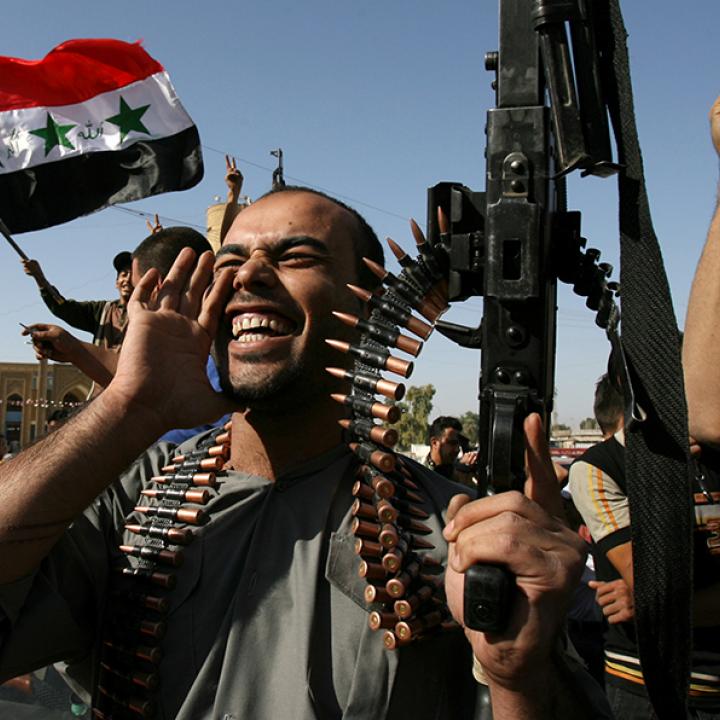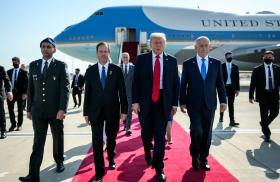

The disintegration of Iraq’s borders and the displacement of its people force us to ask if Iraq has come to an end. If the old Iraq has come to an end but is to remain united, then what is its new identity? If it is to be divided, then where will the jurisdiction of the new proposed federal areas lie?
This resembles a question I posed in 2002 to a close friend of mine, an Iraqi intellectual and prominent professor of sociology at the University of Baghdad. I asked him, “The media is confirming that American forces will occupy Iraq, so who will be Saddam Hussein’s replacement? The replacement will surely be better, don’t you think?” He replied, “They are far worse – they are the radical Islamists. Our societies are enlightened, but the Islamists have the power. Saddam Hussein prohibited all ideas, and even killed all intellectuals. Thus, there is no option aside from the Islamists. They are the only ones who benefit from this war, not democracy, not Western thought, and not enlightenment.”
With this answer given to me by my late professor, may he rest in peace, I once again look to the future in 2016 and ask, what will come after ISIS? Will we produce a new identity to live together, or will we divide Iraq among narrow identities?
My first response to this question is what I expect will happen. My second response is what ought to happen, and what international decision-makers could bring to fruition.
The first scenario is a strong new Islamic caliphate that can create an unstoppable Islamist force. It will create personalities that are crueler, more violent, and more arrogant than Saddam Hussein. The Shiite Iraqi south will resemble a new Ahvaz annexed by Iran, to which it will cling because of the clerics’ strength and influence. Gradually, Iran will become Russia’s political and economic ally and a global power in the region through oil and money. After annexing the Iraqi south, Iran will produce 14 million barrels of oil per day. Its massive financial strength will push it to resume its nuclear project, especially with Russia’s support. Khamenei, or his successor, will become the most powerful leader in the Middle East. He will have the last word, and will determine European and American interests in the region.
The Kurdish left will likely experience new transformations. The current Kurdish leaders will not have a role in the future because the goal of independence will have been achieved. Since the tide of nationalism will have waned, Islamism will be on the rise. Islamists alone have spheres of influence on all Kurdish sides: Syrian, Iraqi, and even Turkish. This may lead to the rise of a Kurdish Erdoğan that meets the demands of the Kurdish public in coordination with the new realities in Turkey, Iraq and Iran.
What remains are the Sunnis under new, radical leadership. They will integrate into a Syria ruled by an influential and capable Islamist government that will also become a proponent of the Erdoğan-driven Islamist agenda.
Iraq will thus be divided up amongst the new caliphates: first Iranian Islamist, and second Turkish Islamist. They will use the collapse of Iraq to expand their political borders and solidify their strength. No one can predict what the political future of this new reality will bring.
The second possibility is not one I expect, but one that I would like to suggest. The world must not allow a repeat of these reactionary empires, which will only strengthen radicalism. Iraq must not be reduced to factions divided up amongst countries governed by reactionary ideologies, like those of Khamenei and Erdoğan. America must also be careful to not inadvertently support radical thought. Instead, a historic opportunity exists to create a new Iraq that could bridge the barrier between the Iranian and Turkish pillars.
Today Iraq is a “sick state.” It is also suffering from the Iraqi government’s corruption, which wasted, during the eight years of al-Maliki’s rule, a budget that equals all of Iraq’s budgets between 1958 and 2003 put together. The majority of this was smuggled to states such as Lebanon to secure their political future.
What this sick Iraqi state is currently going through resembles what the sick Ottoman state went through before collapsing in 1925 and subsequently transforming into the modern Turkish state by Mustafa Kemal Atatürk. Iraq is in need of a “Kemal-like” movement that is Iraqi in shape and form. It should not replicate the Turkish experience, but should instead draw on secular strengths, intellectuals, and military and nationalist leadership to establish a new Iraqi identity separate from what surrounds it on all sides. It should prepare itself to lead a push for independence, and develop an “Iraq first” identity.
Public opinion towards the existing Iraqi Islamist parties is declining rapidly, with most of their support coming from Iran, Turkey, and Qatar. The United States, United Kingdom, and European Union should think of the aspirations of the Iraqi people and work towards a new alternative.
There are forces on the ground that can stand up to radicalism and attempts at fragmentation. These forces are the Iraqi tribes, who supported the establishment of the monarchy in 1921 after Gertrude Bell’s recommendation to the British government. But these tribes, which gathered social power but not political, should not take control for risk of becoming corrupt – rather, they should be organized under secular civil leadership. The tribes can serve as a new source of influence to stand up to Islamists throughout the country.
The remnants of the Iraqi army can also be absorbed by this movement. Similarly, the Sunni and Shiite clerics who denounce Islamism can be included. The Baathists can be granted civil but not political rights, given that their political role now falls outside the scope of reality.
We also need to establish a strong and supportive alliance for this project in Washington D.C. The United States Congress should pass a law called the “Democracy Protection Law.” This law would lay out the details of the 2018 elections through direct United Nations oversight of voting booths, and would strip parties from managing these elections.
Iraq called for modernization before the Ottoman state, and there were many Iraqis in the twenties who wrote about the importance of modernizing Iraq, creating a new identity, and bringing it into the age of enlightenment. They were looking to replace the power of ideology with science, tears with understanding, and hatred with love. I believe that this opportunity has finally arrived.


